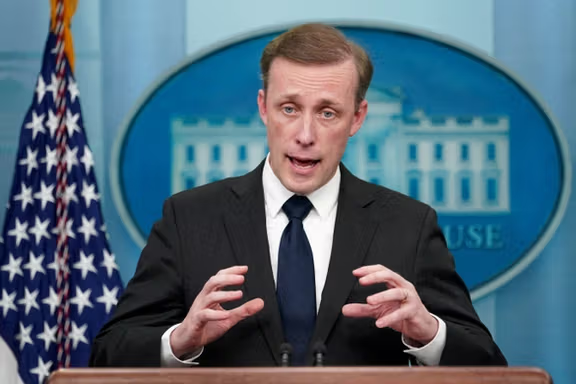Biden Admin Stays Silent On Envoy’s Status, As Iran Leaks Info

Some US lawmakers and others are frustrated about the Biden administration’s silence on the case of its Iran envoy as Tehran's media disclose more information.

Some US lawmakers and others are frustrated about the Biden administration’s silence on the case of its Iran envoy as Tehran's media disclose more information.
National Security Adviser Jake Sullivan, who appeared on CBC News’ "Face the Nation" on Sunday, refused to offer any transparency regarding the FBI investigation of Robert Malley’s mishandling of classified information and his dismissal as the US special envoy for Iran.
“I can't speak to the current circumstances," he said. Instead, he expressed admiration for Malley, saying, " Rob Malley has served multiple administrations faithfully and well. He is a public servant. He is a diplomat. He is engaged in high level, high stakes diplomacy for a long time. And he's someone who a lot of us, including myself, have deep respect for."
He noted that the US has had “indirect contact” with Iran to try to get a deal that could get the American citizens imprisoned in Iran released, adding that “With respect to the nuclear program, we're not close to any kind of a deal.”
Rep. Michael McCaul (R-TX), the chair of the House Foreign Affairs Committee who issued Thursday an ultimatum to the State Department to come clean about the suspension of Malley, also appeared on the show with a tone very different from that of Sullivan.

“We sent a letter. We were rebuked. We have been given no answer about his status,” he said, emphasizing that “this is a top negotiator to Iran” with access to “highest classified secrets.”
"We are giving a deadline of July 25th to have the diplomatic security and management secretary come in and brief us in a classified space,” he said, warning of a “worst case scenario” in which Malley “transferred intelligence and secrets to our foreign adversaries.” “There's no proof of that, but if he did, that would be treason in my view.”
McCaul wrote twice in the past two weeks to Secretary of State Antony Blinken demanding information. The Senior Republican lawmaker was rebuffed the first time.
McCaul asserted that now “the Committee expects prompt and full compliance with its requests, and it will not tolerate obstruction of its oversight of this national security matter.”
Capitol Hill Republicans are growing increasingly frustrated with the Biden administration’s unwillingness to share information about the issue. Adding insult to injury, the Iranian regime’s media is trickling details surrounding the case and infuriating US lawmakers, who believe the Islamic Republic knows more about the issue than they.
In its second article published on Sunday, Tehran Times, a publication controlled by the Iranian regime, provided more astonishing details about Malley's situation.
Tehran Times quoted an unnamed source at the US State Department as telling them that “the main problem of Malley stems from his secret talks with Iranian Ambassador to the UN Saeed Iravani and his meetings with some Iranian American figures in the US.”
According to the article, these people include Ali Vaez, Malley’s former right-hand man at the Crisis Group; Vali Nasr, a professor at Johns Hopkins School of Advanced International Studies; and Trita Parsi, the current employer of Malley’s son at the Quincy Institute, and the founder and former president of the National Iranian American Council (NIAC), which is recognized by Iranians living in the United States as the lobby of the Islamic Republic. “They are Iranian Americans whose presence in Democrats’ Iran diplomacy during the Obama and Biden administrations is quite clear.”
“Thanks to their connection with the former Iranian negotiators, some of whom are still present in the current negotiating team, they play the role of broker and middleman between Tehran and Washington,” Tehran Times said.
Another claim made by the article was that Malley had been in full coordination with the State Department in promoting his negotiation strategies and tactics and his dismissal was not due to a disagreement between the Secretary of State team and the National Security Advisor team, saying that “Perhaps the reason why Secretary of State Tony Blinken did not meet and talk with Malley is because the top diplomat does not want the scope of this scandal to expand and tarnish his reputation.”
On Thursday, a group of 18 Republican senators called for a probe into the murky circumstances surrounding the State Department’s handling of Malley’s security clearance investigation. Spearheaded by Senator Bill Hagerty (R-TN), the group sent a letter to Diana Shaw, the acting inspector general of the Department of State, outlining specific questions that must be answered “no later than Friday, July 21, 2023.”
Congress was kept in the dark about Malley having been suspended at least since early May and was only informed about it when his replacement was announced. Malley’s suspension was first reported by Iran International June 29, and formally announced the following day by Matthew Miller, the spokesperson for the US State Department, calling it "a leave of absence”. However, it is believed he had been suspended as early as April.